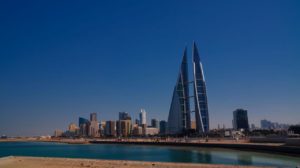Immigration news updates for Bahrain, Japan and more
Americas
United States: Update on passport processing times
Processing time frames have been updated for ordinary and expedited passport services.
Applicants are advised to submit their applications at least four to six months prior to their intended trip. Regular services can now take seven to ten weeks from the day the application is submitted until the day the new passport is obtained. There is no guarantee that urgent travel appointments or in-person services will be available at passport offices or centers.
As the processing times starts when the application is received, the application status may not show ‘’in process’’ for two to four weeks after the application is mailed. The State Department may ask for additional information, which could create delays with some applications.
This summary was prepared using information obtained from the U.S. Department of State.
Disclaimer: The above information is provided for general information purposes only and should not be construed as legal advice. If you have any further inquiries regarding the applicability of this information, please contact Rafael Pavanelli (Regional Immigration Manager, AMER).
Europe, Middle East and Africa
Bahrain: Multi-entry e-visa
The government of Bahrain introduced a multi-entry e-visa, available to foreign nationals travelling to Bahrain for training purposes. Holders of training visas will be entitled to stay in Bahrain for the first six months and, if necessary, an extension is possible for another six months. To be eligible for the visa, applicants must have a passport that is valid for at least six months and attach a letter from the sponsoring organization outlining the goals and specifics of the program.
This summary was prepared using information obtained from the Ministry of Interior.
Qatar: Visa waiver agreement
A bilateral agreement between Qatar and South Korea paves the way for 90 days of visa-free travel for citizens of each country. Citizens of Qatar will be permitted to enter South Korea on a tourist visa and conduct limited business operations (business meetings, consultations, contract signing, and small-scale international trading). To conduct the aforementioned activities, they will need a K-ETA. They should apply for a consular visiting visa if they want to stay for more than 30 days (likely C-3-4 visa or another visa issued at the discretion of the consular post). It’s unclear if South Korean nationals are permitted to engage in commercial operations under the agreement.
This summary was prepared using information obtained from the Gulf Times.
Switzerland: Visa suspension for Russian nationals
The Swiss government has decided to terminate the visa facilitation agreement between Switzerland and Russia. Russian citizens requesting Swiss work permits won’t be impacted by the stricter visa requirements. The suspension of the agreement on visa facilitation does not imply a blanket ban on visas for Russian nationals, but application processes will be more difficult.
This summary was prepared using information obtained from the Federal Office (in German).
Disclaimer: The above information is provided for general information purposes only and should not be construed as legal advice. If you have any further inquiries regarding the applicability of this information, please contact Roberta Carnaccini (Global Operations Director).
Asia-Pacific
Hong Kong: Quarantine changes
The Hong Kong government has published changes to the quarantine measures for inbound travelers.
The quarantine requirements for travelers arriving at Hong Kong depend on the location of the traveler for the previous seven days and on the day of boarding. The requirements are now as follows:
- Non-Hong Kong residents aged 12 or above staying overseas excluding Mainland China, Macao or Taiwan, and have fulfilled vaccination requirement, are allowed to board a flight to Hong Kong.
- All inbound travelers must pass temperature checks upon arrival. Those found with symptoms will be referred to the Department of Health for further handling.
- All inbound travelers are required to undergo medical surveillance, self-monitoring, and compulsory testing in accordance with the relevant regulations.
The following requirements apply to those who have stayed overseas, excluding Mainland China, Macao or Taiwan.
Boarding requirement:
- Fulfilled vaccination requirement: applicable to non-Hong Kong residents aged 12 or above on the scheduled day of departure of the flight to Hong Kong.
- Green Health Declaration QR code: the government recommends inbound travelers, regardless of if they are Hong Kong residents or not, who have fulfilled vaccination requirements, to declare their vaccination records to comply with the requirement to be issued the Provisional Vaccine Pass.
- Rapid Antigen Test (RAT): can be self-administered or by professional swab sampling conducted within 24 hours prior to the scheduled time of departure with a negative result and declare this via the Health Declaration Form.
Medical surveillance requirement post arrival:
- Medical surveillance is required for three days and during the period, subject to Amber Code restrictions under the Vaccine Pass.
- Undergo daily RATs: a negative result should be confirmed before leaving the place of residence.
- On day two: undergo PCR-based nucleic acid test after obtaining a negative result of RAT on the day; and those who consecutively test negative can complete medical surveillance with Amber Code restrictions ending at 9 a.m. on day three.
Self-monitoring requirement:
- Self-monitoring is required in the subsequent four days.
- Undergo daily RATs: a negative result should be confirmed before leaving the place of residence until day seven; and
- On days four and six: undergo PCR-based nucleic acid tests after obtaining negative results of RATs on the respective days.
The day of arrival in Hong Kong is counted as day 0. For example, for a person arriving in Hong Kong on September 26, 2022, the “Day one” would be September 27, 2022 and the “Day seven” would be October 3, 2022.
For those who have only stayed in the Mainland, Macao or Taiwan (i.e. persons arriving in Hong Kong under the Return2hk Scheme and Come2hk Scheme):
Document requirements:
- Green Health Declaration QR code: the government recommends travelers who have fulfilled vaccination requirements to declare their vaccination records in order to comply with the requirement to be issued the Provisional Vaccine Pass.
Self-monitoring and testing requirement:
- Self-monitoring is required for three days; and
- On day two of arrival in Hong Kong: undergo PCR-based nucleic acid test.
- For travelers who have stayed in any place on the ‘List of At-risk Places’ under the Return2hk/ Come2hk scheme on the day of arrival in Hong Kong or the seven days before that day, are required to undergo an extra nucleic acid test on Day one.
This summary was prepared using information obtained from the Government of Hong Kong.
Japan: New border control measures
The government of Japan has released an official announcement regarding the new border control measures.
Below is a summary of the new measures which will take effect on October 11, 2022:
- When applying for a Japanese visa, it is no longer required to apply/ submit an ERFS (screening certificate) in advance. Individual tourists will once again be able to travel to Japan.
- Visa exemption measures will resume.
- Except for those suspected cases of covid-19, for every traveler, it is no longer required to have a PCR test at the arrival airport in Japan, and also no need for quarantine. However, travelers must be triple vaccinated with an approved brand, or have a PCR test showing a negative result and be taken no more than 72 hours before flight departure times.
- The daily cap on arriving visitors will also be abolished. It’s currently set at 50,000 per day but will be removed completely.
This announcement follows the speech made by the prime minister, where he advised that the border restrictions for Japan are to be eased to allow visa free travel for those eligible.
Further information can be found on the World Health Organization (WHO) and Ministry of Health, Labour and Welfare websites.
This summary was prepared using information obtained from the Ministry of Foreign Affairs of Japan.
Taiwan: Visa exemptions restored
From September 29, 2022, Taiwan will restore the visa exemption arrangement for nationals of Chile, Israel, Japan, Republic of Korea, Nicaragua, Dominican Republic, Singapore, Malaysia, Thailand, Brunei and the Philippines.
The full list of visa free countries can be found here.
For the time being Taiwan will maintain its quarantine arrangements, however, there are plans to replace these on October 13 with a seven-day self-monitoring process.
No source available at the time of writing.
Disclaimer: The above information is provided for general information purposes only and should not be construed as legal advice. If you have any further inquiries regarding the applicability of this information, please contact Debra Jane Beynon (Regional Immigration Manager, APAC).
We track policy changes in over 120 countries. Find out how we can help you in this short video.




